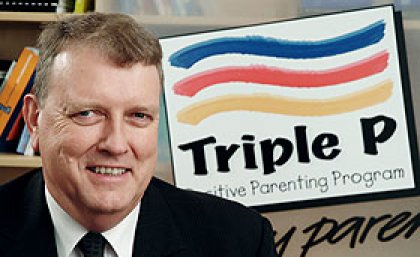
US study finds Australia’s Triple P-Positive Parenting program lowers child abuse injuries and fosters placements
A landmark US study has found that The University of Queensland’s Triple P – Positive Parenting Program can significantly lower rates of child abuse injuries and foster care placements when offered to parents community-wide.
Results of the five-year study, which was funded by the prestigious Center for Disease Control and Prevention and led by Dr Ron Prinz at the University of South Carolina, were published today in the online edition of the Prevention Science journal.
It is the first large-scale study to show that providing all families – not just families at risk – with access to proven parenting information and support can reduce rates of child maltreatment.
The study found that making Triple P available to all parents led to significantly lower rates of confirmed child abuse, fewer out-of-home placements and fewer hospitalisations from child abuse injuries, when compared to communities without access to Triple P.
Researchers estimate for every 100,000 children under the age of eight, the results could translate annually into 688 fewer cases of child maltreatment, 240 fewer children in care and 60 fewer children being admitted to hospital or emergency departments with abuse injuries.
Study co-author, UQ’s Professor Matt Sanders said the research added to the already-strong evidence base of Triple P.
"We already know Triple P can alleviate parents’ stress and depression and help prevent and reduce child emotional and behavioural problems," said Professor Sanders, who is the founder of Triple P and director of the Parenting and Family Support Centre at The University of Queensland.
"But this research shows that by providing all parents – not just those at risk – with parenting support through evidence-based programs, we can have a major impact on child maltreatment.
"We can hold back the growth in child abuse, keep kids out of foster care and in their own homes and see fewer injured children in hospitals."
The US study was conducted in 18 counties in South Carolina, nine of which were chosen randomly to receive Triple P. Parents of children from birth to 12 years could easily access Triple P information through a variety of methods, include mainstream media, brief public seminars and trained counsellors at clinics, schools, churches and community centres.
"We would expect similar results in Australia if all families here were offered easy access to Triple P.
"Parents are looking for practical solutions to parenting problems that work," Professor Sanders said.
The CDC chose Triple P as its preferred parenting method for the study because of its solid evidence base and its flexibility for parents seeking support.
Triple P was developed at The University of Queensland by Professor Sanders and colleagues and is based on 30 years’ clinical research. The program is now used by governments and health authorities in 17 countries – The United States, England, Scotland, Ireland, Canada, Sweden, New Zealand, Hong Kong, Iran, Japan, Germany, Belgium, Singapore, Switzerland, The Netherlands, Curacao and Australia.
Media: Lynnette Haas, Media Manager, Triple P International telephone (07) 3236 1212 / 0417 647 791 or Jan King UQ Communications (07) 3365 1120.
.jpg)



